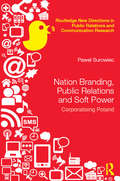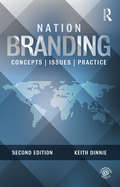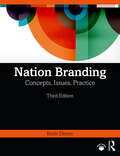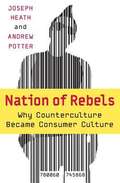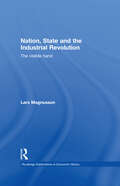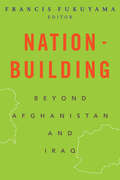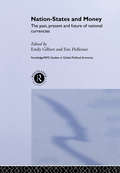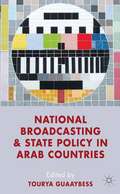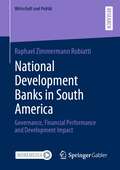- Table View
- List View
Nation Branding, Public Relations and Soft Power: Corporatising Poland (Routledge New Directions in PR & Communication Research)
by Pawel SurowiecNation Branding, Public Relations and Soft Power: Corporatizing Poland provides an empirically grounded analysis of changes in the way in which various actors seek to manage Poland’s national image in world opinion. It explores how and why changes in political economy have shaped these actors and their use of soft power in a way that is influenced by public relations, corporate communication, and marketing practices. <P><P>By examining the discourse and practices of professional nation branders who have re-shaped the relationship between collective identities and national image management, it plots changes in the way in which Poland’s national image is communicated, and culturally reshaped, creating tensions between national identity and democracy. The book demonstrates that nation branding is a consequence of the corporatization of political governance, soft power and national identity, while revealing how the Poland "brand" is shaping public and foreign affairs. <P><P>Challenging and original, this book will be of interest to scholars in public relations, corporate communications, political marketing and international relations.
Nation Branding: Concepts, Issues, Practice
by Keith DinnieNation Branding: Concepts, Issues, Practice was the ground-breaking first textbook to provide an overview of this recently established but fast-growing practice, in which the principles of brand management are applied to countries rather than companies. Many governments have invested in nation branding in order to strengthen their country's influence, improve its reputation, or boost tourism, trade and investment. This new edition has been comprehensively revised and its influential original framework modified to reflect the very latest changes to this still-developing field. It remains an accessible blend of theory and practice rich with international examples and contributions. Updates to this edition: New international cases of countries as diverse as China, United Arab Emirates, Ghana, Cuba, India, Great Britain and many more; New contributions from distinguished scholars, diplomats and businesspeople providing a range of case studies, practitioner insights and academic perspectives; New Companion Website to support the book featuring instructor aids such as PowerPoint presentations for each chapter and an instructor manual; This much-anticipated update to an influential book is an essential introduction to nation branding for students and policy makers.
Nation Branding: Concepts, Issues, Practice
by Keith DinnieNation Branding: Concepts, Issues, Practice provides a theoretical framework, alongside insightful examples from the practice of nation banding, in which the principles of brand strategy and management are applied to countries globally. This new edition has been comprehensively updated and its influential original framework modified to reflect the very latest changes in the field. It remains an accessible blend of theory and practice rich with international examples and contributions. Updates to this edition: New Academic Perspectives and Practitioner Insights in each chapter. Updated and new cases from a broad range of nations and cultures. Fresh coverage of online branding and social media. New material covering the critical and ethical issues of nation branding, including the limitations. Updated references and sources. Updated online resources, including PowerPoint slides, a test bank, and a glossary. This is an essential introduction to nation branding for students of Marketing, Brand Management, Communications, and Public and International Relations, as well as policy makers looking for a rigorous yet applied approach.
Nation Building, State Building, and Economic Development: Case Studies and Comparisons
by Sarah C.M. PaineWhy do some countries remain poor and dysfunctional while others thrive and become affluent? The expert contributors to this volume seek to identify reasons why prosperity has increased rapidly in some countries but not others by constructing and comparing cases. The case studies focus on the processes of nation building, state building, and economic development in comparably situated countries over the past hundred years. Part I considers the colonial legacy of India, Algeria, the Philippines, and Manchuria. In Part II, the analysis shifts to the anticolonial development strategies of Soviet Russia, Ataturk's Turkey, Mao's China, and Nasser's Egypt. Part III is devoted to paired cases, in which ostensibly similar environments yielded very different outcomes: Haiti and the Dominican Republic; Jordan and Israel; the Republic of the Congo and neighboring Gabon; North Korea and South Korea; and, Papua New Guinea and Indonesia. All the studies examine the combined constraints and opportunities facing policy makers, their policy objectives, and the effectiveness of their strategies. The concluding chapter distills what these cases can tell us about successful development - with findings that do not validate the conventional wisdom.
Nation Of Rebels: Why Counterculture Became Consumer Culture
by Joseph Heath Andrew PotterIn this wide-ranging and perceptive work of cultural criticism, Joseph Heath and Andrew Potter shatter the most important myth that dominates much of radical political, economic, and cultural thinking. The idea of a counterculture -- a world outside of the consumer-dominated world that encompasses us -- pervades everything from the antiglobalization movement to feminism and environmentalism. And the idea that mocking or simply hoping the "system" will collapse, the authors argue, is not only counterproductive but has helped to create the very consumer society radicals oppose. In a lively blend of pop culture, history, and philosophical analysis, Heath and Potter offer a startlingly clear picture of what a concern for social justice might look like without the confusion of the counterculture obsession with being different.
Nation, State and the Industrial Revolution: The Visible Hand (Routledge Explorations in Economic History)
by Lars MagnussonThe industrial revolution and the creation of the modern (national) state are two of the most important historical processes to have occurred in Europe during the 19th century. The state and other bodies of governance play an important role in the development of capitalist market societies since the 18th century. But modern market economies are to a large degree a product of the interplay between market and governance. Yet we are often told a strikingly different tale about the modern economy, at least how it ought to work and operate - as far as possible without public interference. Even more frequently we have been taught that the modern capitalist market economy is a product of an industrial revolution, originating with the UK in the middle of the 18th century propelled by laissez faire and the triumph of free markets which gradually liberated themselves from the grip of an old dirigiste state. This book argues that in order to get a better understanding of this period and the rise of modern industrial capitalism it is necessary to link the industrial revolution in its various forms to a political and institutional context of state-making and the creation of modern national states. Professor Magnusson demonstrates that a historical narrative which does not acknowledge the role of the state and public governance for the establishment of the modern capitalist market economy is fundamentally flawed.
Nation-Building, Education and Culture in India and Canada: Advances in Indo-Canadian Humanities and Social Sciences Research
by K. Gayithri B. Hariharan Suchorita ChattopadhyayThis volume provides comparative perspectives on issues related to education, culture, sustainable development and nation-building in India and Canada. It takes cognizance of current research in Indo-Canadian comparative studies and is meant to facilitate further research in these areas. It importantly highlights the trends and growth areas in comparative social science and humanities research between the countries. The chapters in this volume discuss the research that scholars have recently undertaken in both countries and the impact that such comparative research has on developing partnerships, learning methodologies, and socio-cultural narratives that empower interdisciplinary research. The chapter authors take up important issues related to community college development, mental health in education, multilingual education, indigenous populations and their education and development. They discuss issues related to bilateral and foreign trade agreements as well as policies of the two countries on climate change research. Lastly, they discuss indigenous performance cultures and sports in the two countries and the long history of migration from India to Canada. The volume is of interest to a wide readership from the humanities and social sciences, particularly readers interested in Indo-Canadian scholarship.
Nation-Building: Beyond Afghanistan and Iraq (Forum on Constructive Capitalism)
by Francis FukuyamaBestselling author Francis Fukuyama brings together esteemed academics, political analysts, and practitioners to reflect on the U.S. experience with nation-building, from its historical underpinnings to its modern-day consequences. The United States has sought on repeated occasions to reconstruct states damaged by conflict, from Reconstruction in the South after the Civil War to Japan and Germany after World War II, to the ongoing rebuilding of Iraq. Despite this rich experience, there has been remarkably little systematic effort to learn lessons on how outside powers can assist in the building of strong and self-sufficient states in post-conflict situations.The contributors dissect mistakes, false starts, and lessons learned from the cases of Afghanistan and Iraq within the broader context of reconstruction efforts in other parts of the world, including Latin America, Japan, and the Balkans. Examining the contrasting models in Afghanistan and Iraq, they highlight the Coalition Provisional Authority in Iraq as a cautionary example of inadequate planning. The need for post-conflict reconstruction will not cease with the end of the Afghanistan and Iraq missions. This timely volume offers the critical reflection and evaluation necessary to avoid repeating costly mistakes in the future.Contributors: Larry Diamond, Hoover Institution and Stanford University; James Dobbins, RAND; David Ekbladh, American University; Michèle A. Flournoy, Center for Strategic and International Studies; Francis Fukuyama, Paul H. Nitze School of Advanced International Studies, Johns Hopkins University; Larry P. Goodson, U.S. Army War College; Johanna Mendelson Forman, UN Foundation; Minxin Pei, Samia Amin, and Seth Garz, Carnegie Endowment for International Peace; S. Frederick Starr, Central Asia–Caucacus Institute at Johns Hopkins School of Advanced International Studies; F. X. Sutton, Ford Foundation Emeritus; Marvin G. Weinbaum, University of Illinois at Urbana–Champaign
Nation-States and Money: The Past, Present and Future of National Currencies (Ripe Series In Global Political Economy Ser.)
by Eric Helleiner Emily GilbertNational currencies appear to be threatened from all sides. European Union member countries are due to abandon their national currencies in favour of a supranational currency by the year 2000. Elsewhere, the use of foreign currencies within national economic spaces is on the increase, as shown by the growth of eurocurrency activity, and currency su
Nation-States and the Multinational Corporation: A Political Economy of Foreign Direct Investment
by Nathan M. JensenWhat makes a country attractive to foreign investors? To what extent do conditions of governance and politics matter? This book provides the most systematic exploration to date of these crucial questions at the nexus of politics and economics. Using quantitative data and interviews with investment promotion agencies, investment location consultants, political risk insurers, and decision makers at multinational corporations, Nathan Jensen arrives at a surprising conclusion: Countries may be competing for international capital, but government fiscal policy--both taxation and spending--has little impact on multinationals' investment decisions. Although government policy has a limited ability to determine patterns of foreign direct investment (FDI) inflows, political institutions are central to explaining why some countries are more successful in attracting international capital. First, democratic institutions lower political risks for multinational corporations. Indeed, they lead to massive amounts of foreign direct investment. Second, politically federal institutions, in contrast to fiscally federal institutions, lower political risks for multinationals and allow host countries to attract higher levels of FDI inflows. Third, the International Monetary Fund, often cited as a catalyst for promoting foreign investment, actually deters multinationals from investment in countries under IMF programs. Even after controlling for the factors that lead countries to seek IMF support, IMF agreements are associated with much lower levels of FDI inflows.
National 5 Business Management
by Peter HaganWe are working with SQA to gain endorsement for this straightforward guide to all five core areas of the latest syllabus.- Written by an experienced author and examiner- Offers an innovative approach and layout in-line with CfE approaches to learning- Provides a wide range of classroom and homework activities
National Administrations in EU Trade Policy
by Johan AdriaensenThis book studies the relationshipbetween administrative capacity and a member state's influence in the EuropeanUnion. More specifically, it studies member states' ability to exert controlover the European Commission during trade negotiations. But what determinesadministrative capacity and how do member states ensure their preferences aredefended during trade negotiations? A combination of qualitative fieldwork and survey-analysisprovides the answer. Interviews in Belgium, Poland, Estonia and Spain offer aprivileged insight into the functioning of national trade administrations andits effects on their behavior in the Council of Ministers. Through survey data,these findings are further corroborated. The book is aimed at a readershipinterested in EU decision-making, negotiation theory, comparative publicadministration and the international political economy of trade.
National Brands and Global Markets: An Historical Perspective (Perspectives in Economic and Social History)
by Nikolas Glover Glover NikolasBetween Brexit, efforts to ‘Make America great again’, and ongoing appeals for patriotic consumption to boost economies, the intersection between national identity, marketing campaigns, and consumer choices has been brought to the fore. This book maps out this terrain and provides a framework for how research on ‘Made in’ campaigns and programmes in individual countries can be placed into a broader historical context. The book argues that the history of ‘Made in’ can be used to shed light on society at large: the actors that have promoted it, the institutions that have regulated it, and the cultural environments that have attributed it meaning. At times ‘Made in’ has been a basic, descriptive trade mark, while, in other periods, it has been a key component of carefully developed commercial brands, and in yet other instances it has been used in attempts to forge and redefine national identities. The book opens with an introduction to the three key factors which have featured prominently in ‘Made in’ campaigns – commercial logic, national economic policy, and its use as an instrument in political discourse, and it provides an overview of the evolution of ‘Made in’ from a marketing perspective. This is followed by country-specific discussions of ‘Made in’ with case studies including countries in Western Europe, the US, Japan, and the antipodes. This book will be of significant interest to students and scholars of economic history, business history, and marketing. Chapter 7 of this book is available for free in PDF format as Open Access from the individual product page at www.routledge.com. It has been made available under a Creative Commons Attribution-Non Commercial-No Derivatives 4.0 license.
National Brands and Private Labels in Retailing
by Francisco J. Martínez-López Juan Carlos Gázquez-Abad Irene Esteban-Millat Juan Antonio Mondéjar-JiménezThis book presents latest findings on brand marketing in retail. In times of economic downturn a "new retailing landscape" is being shaped, in which retailers and manufacturers face new challenges to their brand strategies. Marketing professionals need high value-added and timely responses. Among the topics targeted in this volume are: mix of national brands and private labels in retailers' assortments; assortment decisions in times of economic crisis and eventual recovery; consequences of delisting brands on store-related aspects; delisting manufacturers' brands and the effects on the distribution channel relationship; the new "retailing landscape", with special focus on fast moving consumer goods retailing; consumer preferences for national brands and private labels and many more.
National Broadcasting and State Policy in Arab Countries
by Tourya GuaaybessA state-of-the-art analysis of the situation of national television in Arab countries, addressing what Arab national broadcastings today say about public policy and political opening. The essays deal with the reforms of public broadcasting organizations and the evolution, perspectives and issues of national broadcasting.
National Campaign to Prevent Teen Pregnancy
by John C. Sawhill Susan S. HarmelingThe National Campaign to Prevent Teen Pregnancy was founded in 1995 to bring together a variety of efforts to reduce teen pregnancy in the United States. Over the last four years the campaign has recruited a prestigious board, developed effective programs for influencing the media, attracted a strong staff, sponsored research on the causes of the high teen pregnancy rate in the United States, and raised significant funds. The campaign's board and staff must now decide how rapidly to grow, whether to establish a local presence, what their research priorities should be, and how to work effectively with others in the field.
National Chemical Corp.: Tiger-Tread
by Richard N. CardozoA large chemical company has developed a novel industrial maintenance item, for which a marketing program and budget must be prepared. Case requires students to forecast demand at end-user and industrial customer levels to identify elements of the marketing mix, and to prepare a plan and budget.
National Convenience Stores, Inc.
by Stuart C. Gilson Steven R. Fenster Roy BurstinNational Convenience Stores seeks to emerge from Chapter 11. Central to the nature of the reorganization plan is the company's determining enterprise value. The various constituencies (secured debt, unsecured debt, etc.) will seek to find an enterprise value that coincides with their interest. The case provides detailed projection data to permit full utilization of the relevant techniques.
National Cranberry Cooperative
by Jeffrey G. Miller R. Paul OlsenRequires an analysis of both the process flows and the production control system used in a cranberry receiving plant. A rewritten version of an earlier case.
National Cranberry Cooperative 1996
by Roy D. ShapiroDescribes the continuous flow process used to process cranberries into juice and/or sauce. Requires student to analyze process flows to determine where the bottlenecks are and to decide how, and whether, to expand capacity. Original version written by J.G. Miller and R.P. Olson.
National Culture and Management
by Philip M. RosenzweigThe note examines the relationship of national culture to management. Offers a definition of culture, explains the scope of culture and its many dimensions, and describes how culture is manifested in business settings. The research of Edward Man, Geert Hofstede, and others is discussed.
National Cultures and Work-Related Values, The Hofstede Study
by Herminia IbarraPeople from different national cultures often operate under different assumptions about what is appropriate behavior. In organizational settings, these cultural differences in underlying assumptions can significantly affect interactions when individuals from various nationalities meet. This note describes a landmark study by Geert Hofstede of the impact of national culture on the work-related attitudes and values of IBM employees in 40 countries.
National Cyber Emergencies: The Return to Civil Defence (Routledge Studies in Conflict, Security and Technology)
by Greg Austin OliverThis book documents and explains civil defence preparations for national cyber emergencies in conditions of both peace and war. The volume analyses the escalating sense of crisis around state-sponsored cyber attacks that has emerged since 2015, when the United States first declared a national emergency in cyberspace. It documents a shift in thinking in the USA, from cooperative resilience-oriented approaches at national level to more highly regulated, state-led civil defence initiatives. Although the American response has been mirrored in other countries, the shift is far from universal. Civil defence strategies have come into play but the global experience of that has not been consistent or even that successful. Containing contributions from well-placed scholars and practitioners, this volume reviews a selection of national experiences (from the USA, Australia, India, China, Estonia, and Finland) and a number of key thematic issues (information weapons, alliance coordination, and attack simulations). These demonstrate a disconnect between the deepening sense of vulnerability and the availability of viable solutions at the national level. Awareness of this gap may ultimately lead to more internationally oriented cooperation, but the trend for now appears to be more conflictual and rooted in a growing sense of insecurity. This book will be of much interest to students of cyber security, homeland security, disaster management, and international relations, as well as practitioners and policy-makers.
National Demographics & Lifestyles (A)
by Michael J. Roberts Ennis J. WaltonDescribes National Demographics and Lifestyles (NDL), a Colorado-based company that compiles a database from product "warranty registration cards" and sells mailing lists from this database. The company has burned through more rounds of financing than ever intended, and its founders must decide whether--and how--to approach their venture backers for more financing. And, the venture capitalists must decide whether to proceed or not. May be used with National Demographics & Lifestyles (B).
National Development Banks in South America: Governance, Financial Performance and Development Impact (Wirtschaft und Politik)
by Raphael Zimmermann RobiattiThis book features an in-depth comparative study of South American National Development Bank’s governance systems. It explores the relationship between bank governance and performance frameworks, both in terms of financial-economic indicators and development impact. It seeks to observe, analyze, and compare governance arrangements used by different development banks as tools to overcome the challenges associated with state-ownership while remaining financially sustainable and aligned with their policy mandates.
